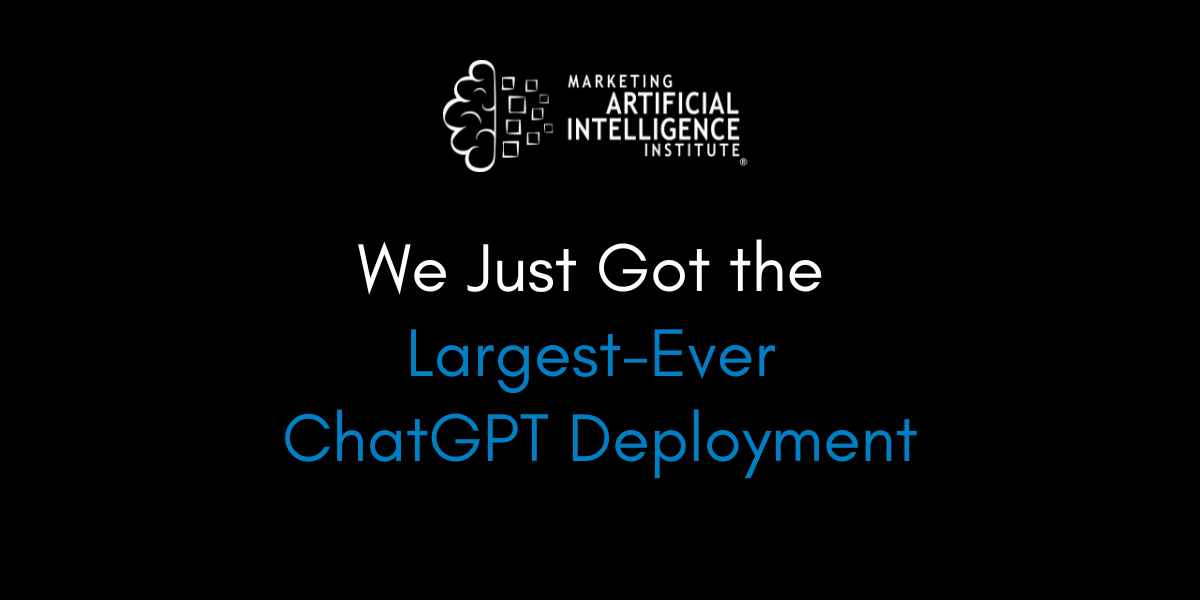California State University (CSU) just made a massive move in higher ed that might set the tone for how colleges nationwide adopt AI.
The 23-campus system, serving more than 460,000 students and 63,000 staff and faculty, is rolling out a specialized version of ChatGPT—called ChatGPT Edu—to all of them. It's also the largest-ever deployment of the tool so far.
Yes, that’s right:
CSU just became the first truly AI-powered university system in the US.
To unpack what this means for higher education, I spoke with Marketing AI Institute founder and CEO Paul Roetzer on Episode 135 of The Artificial Intelligence Show.
Why Is This Such a Big Deal?
OpenAI announced the partnership earlier this week. CSU will leverage ChatGPT Edu, a version of ChatGPT designed for educational institutions.
Faculty can use it for curriculum development, building course-specific GPTs to enhance teaching. Students get personalized tutoring and study guides. And the university is also launching a platform offering free AI training programs and certifications, plus apprenticeship opportunities in AI-driven industries.
Preliminary studies suggest the impact could be significant. One Harvard study found AI-powered tutoring doubled student engagement and improved problem-solving skills. Microsoft says people with AI skills are 70% more likely to be hired.
In other words, CSU isn’t just handing out fancy tech. They’re building an entire AI ecosystem for their community.
“I think it’s great from a university perspective to have a vision for this,” says Roetzer. “Not just getting the licenses and handing them out, but actually making sure that they’re being used in a responsible way.”
He compares it to searching for a high school or college for his own kids.
“If my daughter was, say, considering one school that had a very aggressive program to integrate AI, drive literacy, and drive usage and another that outlawed it or considered it plagiarism, there’s a really good chance I’m going to try and help her see the opportunity of the more modernized school.”
The Upside—and the Obstacles
Of course, building an AI-powered university won’t be all smooth sailing. For one thing, not everyone on campus is sold on using AI. After all, some professors still see ChatGPT as an instrument for cheating, not an educational advantage.
Roetzer thinks the difference-maker here is structured support and best practices:
“That’s going to be the painful part,” he says. “You can sit here and lay out a vision for what this looks like. But the change management is going to need things like: building centers of excellence for teachers so they can share best practices. And creating personalized use cases that are going to be most relevant to each department and each teacher.”
But that’s easier said than done.
“You’re going to have a whole bunch of teachers and professors who want nothing to do with this,” says Roetzer. “You’re not going to convince them this isn’t cheating, that it’s not cutting short critical thinking. And that’s going to be the biggest problem, honestly, especially at the university level where there’s tenure involved.”
What Happens Next?
Despite the hurdles, CSU’s leap into AI could be showing us a glimpse of the future of education. If it works, universities around the country might line up for ChatGPT Edu, especially now that it includes enterprise-level security and specialized pricing.
There’s also a broader battle for the hearts and minds of tomorrow’s workforce, says Roetzer.
“There is a battle for the next generation of workers,” he says. “When kids come out of school, they’re either going to be loyal to ChatGPT or Gemini (currently). There’s a battle for mindshare and usage.”
Bottom line?
CSU is boldly embracing AI, positioning itself to create a generation of graduates who see ChatGPT and similar technologies as standard-issue tools. It’s a trailblazing move—and it just might change how all of us think about the future of education.
Mike Kaput
As Chief Content Officer, Mike Kaput uses content marketing, marketing strategy, and marketing technology to grow and scale traffic, leads, and revenue for Marketing AI Institute. Mike is the co-author of Marketing Artificial Intelligence: AI, Marketing and the Future of Business (Matt Holt Books, 2022). See Mike's full bio.



